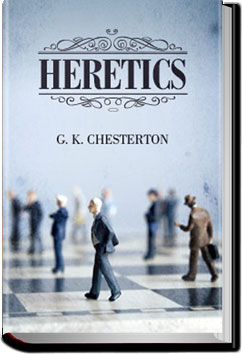The Author Gilbert Keith Chesterton was born in London, England on the 29th of May, 1874. Though he considered himself a mere “rollicking journalist,” he was actually a prolific and gifted writer in virtually every area of literature.
A man of strong opinions and enormously talented at defending them, his exuberant personality nevertheless allowed him to maintain warm friendships with people–such as George Bernard Shaw and H. G. Wells–with whom he vehemently disagreed. Chesterton had no difficulty standing up for what he believed. He was one of the few journalists to oppose the Boer War. His 1922 “Eugenics and Other Evils” attacked what was at that time the most progressive of all ideas, the idea that the human race could and should breed a superior version of itself. In the Nazi experience, history demonstrated the wisdom of his once “reactionary” views.
most solitary exception to the general
and essential maxim, that little things please great minds. And from
this absence of that most uproarious of all things, humility, comes
incidentally the peculiar insistence on the Superman. After belabouring
a great many people for a great many years for being unprogressive, Mr.
Shaw has discovered, with characteristic sense, that it is very
doubtful whether any existing human being with two legs can be
progressive at all. Having come to doubt whether humanity can be
combined with progress, most people, easily pleased, would have elected
to abandon progress and remain with humanity. Mr. Shaw, not being
easily pleased, decides to throw over humanity with all its limitations
and go in for progress for its own sake. If man, as we know him, is
incapable of the philosophy of progress, Mr. Shaw asks, not for a new
kind of philosophy, but for a new kind of man. It is rather as if a
nurse had tried a rather bitter food for some years on a baby, and on
discovering that it was not suitable, should not throw away the food
and ask for a new food, but throw the baby out of window, and ask for a
new baby. Mr. Shaw cannot understand that the thing which is valuable
and lovable in our eyes is man—the old beer-drinking, creed-making,
fighting, failing, sensual, respectable man. And the things that have
been founded on this creature immortally remain; the things that have
been founded on the fancy of the Superman have died with the dying
civilizations which alone have given them birth. When Christ at a
symbolic moment was establishing His great society, He chose for its
comer-stone neither the brilliant Paul nor the mystic John, but a
shuffler, a snob a coward—in a word, a man. And upon this rock He has
built His Church, and the gates of Hell have not prevailed against it.
All the empires and the kingdoms have failed, because of this inherent
and continual weakness, that they were founded by strong men


